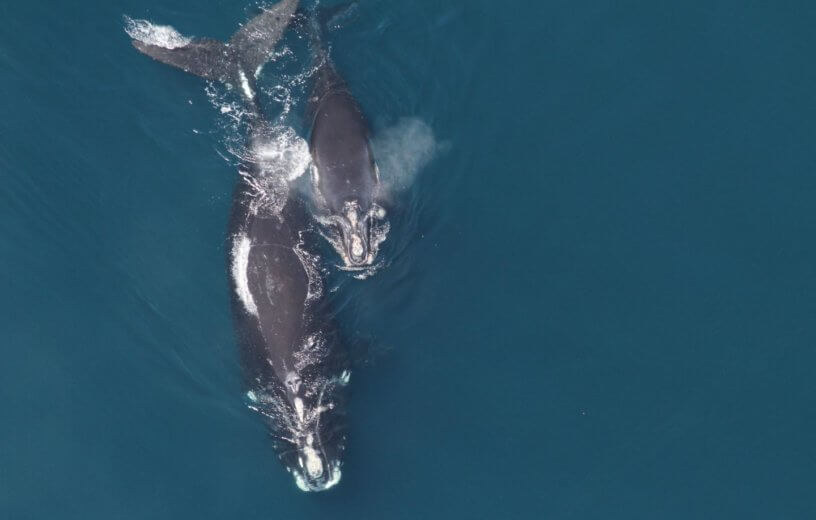DURHAM, N. C. — Mothers go to extraordinary lengths to protect their children, and we’re not just talking about humans. There are examples all over nature of new mothers being ultra-protective of their newborns. Now, a fascinating new study has uncovered one such protective behavior among the critically endangered North Atlantic right whale. New moms of this species actually tone down their underwater vocalizations, and “whisper” to their calves to avoid attracting nearby predators.
Of course, right whales are incredibly large marine mammals, and don’t necessarily have too many predators to worry about on a daily basis. However, young whale calves are still very much vulnerable during their youth, especially to orcas and sharks.
When communicating amongst one another, right whales produce a vocalization called an “up call,” which results in a rather obnoxious “whopping” sound that tends to travel long distances underwater, and can even resonate for up to two seconds. Essentially, these whales are anything but subtle when fully grown adults are “talking.”
However, mothers communicate with their young using a different sound; a quiet, short, grunt-like vocalization that can only be heard within a very short distance.
Scientists were completely unaware of these careful, quiet sounds until a research team from Duke University, Syracuse University, and NOAA Fisheries’ Northeast Fisheries Center collaborated to collect acoustic data from right whales off the coasts of Florida and Georgia. The research team attached small, non-invasive recording equipment using suction cups to young whales, pregnant whales, and mother-calf pairs found in coastal areas known for calving activity.
“These sounds can be thought of almost like a human whisper,” says study leader Susan Parks, a Biology Professor at Syracuse University, in a release. “They allow the mother and calf to stay in touch with each other without advertising their presence to potential predators in the area.”
“The mothers significantly reduced the number of higher-amplitude, long-distance communication signals they produced compared to the juvenile and pregnant whales,” adds Douglas Nowacek, a co-author on the study and a professor at Duke University. “They also produced these very quiet, whisper-like sounds. This suggests that right whale mother-calf pairs rely on acoustic crypsis — a type of behavior meant to avoid detection — to reduce the risk of eavesdropping by orcas or sharks lurking in nearby murky waters.”
Unfortunately, right whales are struggling to sustain themselves as a species due to an overall low number of calves being born each year. That’s also confounded by the troubling trend of reproductive females being killed due to collisions with large sea vessels or becoming accidentally entangled in fishing gear.
Right now, there are only an estimated 420 North Atlantic right whales living in the wild. There have been 30 confirmed right whale killings in just the past three years. The study’s authors say every single additional death reduces the species’ chances of survival.
“There are still many things we don’t know about their behaviors, and it is my hope that studies like this will help to improve efforts for their conservation,” Parks concludes.
The study is published in the scientific journal Biology Letters.
